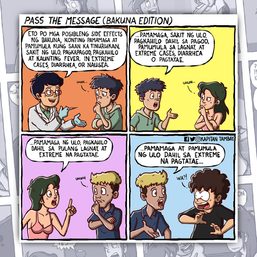SUMMARY
This is AI generated summarization, which may have errors. For context, always refer to the full article.

We hope everyone’s having a safe day!
This week’s Cybersecurity Roundup features the sentencing of a hacker accused of attacking Yahoo for Russian intelligence agents, a report about a recently analyzed cheap-to-buy malware criminals are using to take data from others, and Kasperky getting rejected by a US judge in its bid to not be banned by the US government.
Accused Yahoo hacker Karim Baratov gets 5 years in prison, fine
A man accused of taking part in devastating cyberattacks on Yahoo for Russian intelligence agents was sentenced on Tuesday, May 29, US time, to 5 years in prison in a plea bargain with prosecutors.
The deal struck by 23-year-old Karim Baratov, who immigrated to Canada from Kazakhstan, also resulted in a fine that “encompasses all his remaining assets,” the US Justice Department said in a statement.
Nocturnal Stealer malware lets crooks steal data for $25
Proofpoint has a report up regarding a recently analyzed malware that steals data from people, and is being sold for 1,500 rubles ($25). The report states the malware, dubbed Nocturnal Stealer on an underground forum, is designed to steal data found within multiple Chromium and Firefox based browsers, as well as cryptocurrency wallets and saved FTP passwords on Filezilla.
While not an advaned type of malware, it does show criminal markets taking advantage of variations of criminal software.

U.S. judge rejects Kaspersky suit against government ban on its products
A Washington judge on Wednesday, May 30, US time, rejected a lawsuit by Russian computer security company Kaspersky Lab against the ban on use of its anti-virus software by government agencies.
While Kaspersky complained the ban was in effect a “punishment” of the company without it having given it any kind of hearing, Federal court judge Colleen Kollar-Kotelly rejected the argument. She said the US government had the right to institute the ban to defend its computer security.

National Privacy Commission mitigating data privacy risks of National ID System
The National Privacy Commission (NPC) launched Privacy Awareness Week in the country by addressing the risks of data privacy concerning the Philippine Identification System (PhilSys) proposal, expected to be ratified by Congress.
Part of the technical working group that drafted the proposal later adopted as Senate Bill No. 1738, the NPC said they intend to build trust with the people by mitigating risks of breaches and leakages. The commission will ensure other government agencies adhere to the Data Privacy Act (DPA) when handling or processing personal data. – Rappler.com
Add a comment
How does this make you feel?





There are no comments yet. Add your comment to start the conversation.